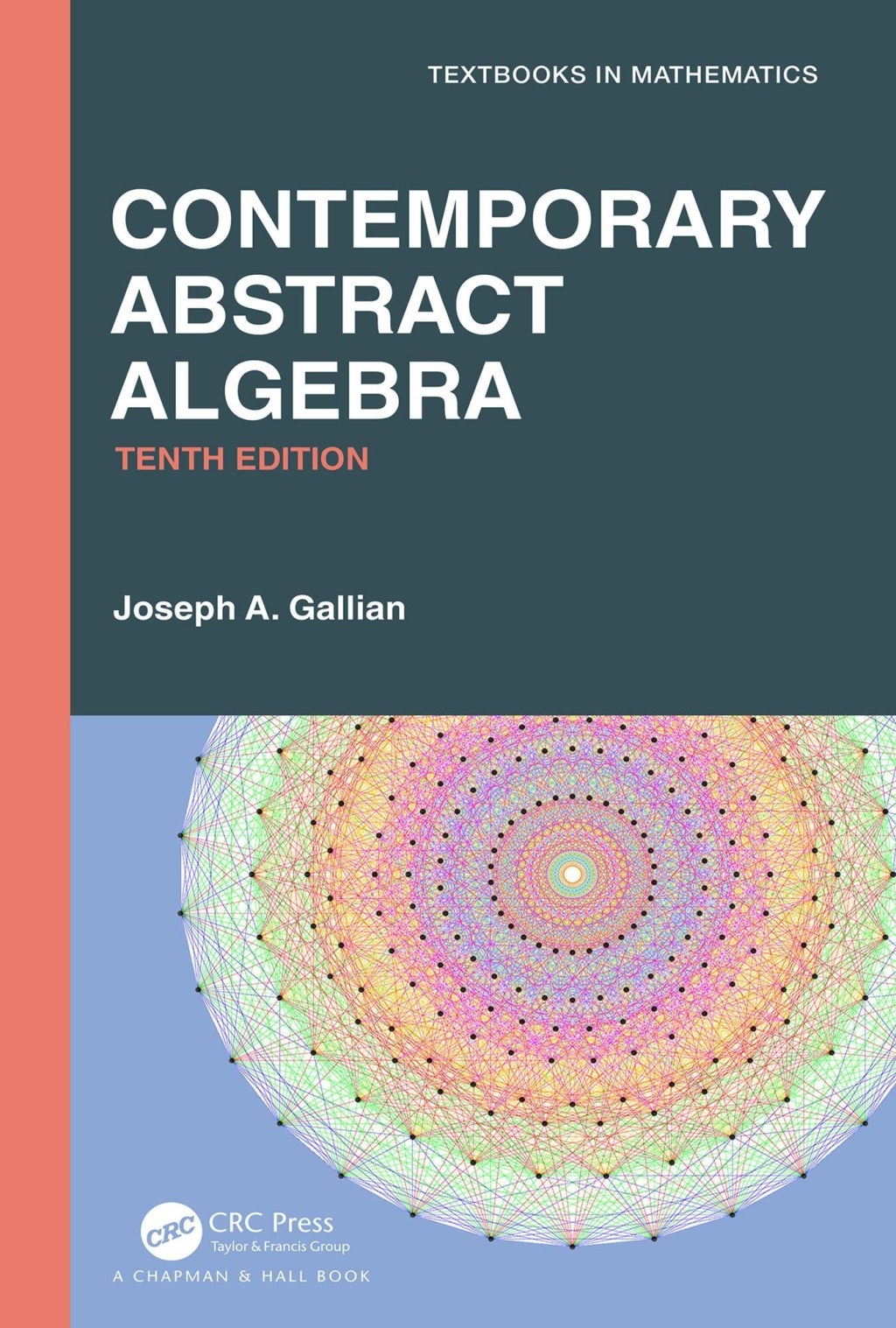Innovative Approach To Contemporary Abstract Algebra: Unlocking Mathematical Possibilities
Contemporary Abstract Algebra: A Comprehensive Guide to the Study of Algebraic Structures
Introduction
Welcome, Smart Peoples, to our comprehensive guide on contemporary abstract algebra! In this article, we will explore the fascinating world of algebraic structures and delve into the intricacies of contemporary abstract algebra. Whether you are a mathematics enthusiast, a student, or simply curious about abstract algebra, this guide is here to equip you with the knowledge and understanding you need to navigate this captivating subject.
2 Picture Gallery: Innovative Approach To Contemporary Abstract Algebra: Unlocking Mathematical Possibilities


Abstract algebra, also known as modern algebra, is a branch of mathematics that deals with algebraic structures such as groups, rings, fields, and modules. It goes beyond elementary algebra, which primarily focuses on manipulating numbers and equations, and explores the concepts and properties of these abstract structures. Contemporary abstract algebra builds upon the foundations laid by classical algebraists and extends the study to more advanced topics, making it a vital area of research and study in the field of mathematics.

Image Source: ebayimg.com
In this guide, we will provide a comprehensive overview of contemporary abstract algebra, discussing its history, key concepts, applications, advantages, and potential drawbacks. By the end of this article, you will have a solid understanding of the fundamental principles of contemporary abstract algebra and be able to appreciate its significance in various areas of mathematics and beyond.
What is Contemporary Abstract Algebra? 🧮
Contemporary abstract algebra is the branch of mathematics that focuses on the study of algebraic structures and their properties. It explores abstract mathematical objects, such as groups, rings, fields, and modules, and investigates the relationships and operations within these structures. These abstract structures enable mathematicians to analyze and understand complex mathematical systems, making contemporary abstract algebra a crucial field in modern mathematics.

Image Source: weltbild.de
At its core, contemporary abstract algebra seeks to generalize the algebraic concepts and operations we are familiar with from elementary algebra. It provides a framework to analyze mathematical structures in a more abstract and rigorous manner, allowing for the study of common patterns and properties that exist across different algebraic systems.
By abstracting away from specific numbers or equations, contemporary abstract algebra allows for a deeper understanding of mathematical structures and their interconnections. It provides a language to express and explore mathematical ideas that are applicable to a wide range of disciplines, including computer science, physics, cryptography, and more.
In the next sections, we will delve into the key aspects of contemporary abstract algebra, including its historical background, important figures, applications, advantages, and disadvantages.
Who Were the Pioneers of Contemporary Abstract Algebra? 👩🔬👨🔬
Contemporary abstract algebra has been shaped by the contributions of numerous mathematicians throughout history. In the late 19th and early 20th centuries, several mathematicians laid the groundwork for modern algebra by developing key concepts and theories.
One of the pioneers of abstract algebra was Évariste Galois, a French mathematician who made significant contributions to the field in the early 19th century. Galois’ work on the solvability of polynomial equations and his exploration of group theory revolutionized algebra and laid the foundation for contemporary abstract algebra.
Another important figure in the development of contemporary abstract algebra is David Hilbert, a German mathematician who made substantial contributions to various areas of mathematics, including algebraic number theory and invariant theory. Hilbert’s influential work on algebraic fields and his formulation of the famous Hilbert’s basis theorem further advanced the field of abstract algebra.
Other notable mathematicians who made significant contributions to contemporary abstract algebra include Emmy Noether, who made groundbreaking contributions to the theory of rings and modules, and Alexander Grothendieck, who revolutionized algebraic geometry and homological algebra.
These mathematicians, along with many others, paved the way for the development of contemporary abstract algebra and established it as a crucial field of study in mathematics.
When Did Contemporary Abstract Algebra Emerge? ⌛️
Contemporary abstract algebra emerged as a distinct branch of mathematics in the late 19th and early 20th centuries. While the study of algebraic structures dates back to ancient times, it was the work of mathematicians in the 19th and 20th centuries that led to the formalization and development of abstract algebra as we know it today.
Évariste Galois’ groundbreaking work on group theory and the solvability of polynomial equations in the early 19th century laid the foundation for contemporary abstract algebra. Galois’ ideas provided the framework for understanding the underlying structures and symmetries of equations, leading to the development of group theory and the broader field of abstract algebra.
As the 20th century progressed, mathematicians like David Hilbert, Emmy Noether, and Alexander Grothendieck further expanded the study of abstract algebra, developing new theories, concepts, and applications. Their work solidified the importance of abstract algebra as a fundamental area of research in mathematics and laid the groundwork for contemporary abstract algebra to flourish.
Where is Contemporary Abstract Algebra Applied? 🌍
Contemporary abstract algebra finds applications in various branches of mathematics, as well as in other fields beyond mathematics. Its foundational concepts and principles have proven to be invaluable in tackling complex problems and modeling real-world phenomena.
One of the primary areas where contemporary abstract algebra is applied is in cryptography and information security. Algebraic structures, such as finite fields and groups, play a crucial role in developing secure encryption algorithms and protocols. The mathematical foundations of contemporary abstract algebra provide the necessary tools to analyze the security of cryptographic systems and design robust encryption schemes.
Contemporary abstract algebra also finds applications in computer science and coding theory. The study of error-correcting codes, for example, relies on algebraic structures to encode and decode information. Algebraic coding theory allows for the efficient transmission and retrieval of data in the presence of errors or noise.
Beyond its applications in computer science and cryptography, contemporary abstract algebra is also utilized in physics, particularly in areas such as quantum mechanics and particle physics. Algebraic structures and concepts provide a language to describe and analyze the symmetries and transformations that govern fundamental particles and physical phenomena.
These are just a few examples of the diverse applications of contemporary abstract algebra. Its reach extends to various fields, including economics, engineering, genetics, and more, making it an indispensable tool in modern scientific and technological advancements.
Why Study Contemporary Abstract Algebra? 🤔
Studying contemporary abstract algebra offers a multitude of benefits for mathematicians, students, and enthusiasts alike. Here are some compelling reasons why delving into the realm of abstract algebra is worth your time and effort:
1️⃣ Deepens your understanding of algebraic concepts: Abstract algebra allows you to explore familiar algebraic concepts in a more rigorous and abstract manner, providing a deeper understanding of their underlying principles and properties.
2️⃣ Enhances problem-solving skills: Abstract algebra challenges you to think critically and creatively, honing your problem-solving skills. It encourages you to apply mathematical reasoning and proofs to tackle complex problems.
3️⃣ Expands your mathematical toolkit: Contemporary abstract algebra equips you with a range of powerful tools, techniques, and mathematical structures that can be applied to various areas of mathematics and beyond.
4️⃣ Opens doors to advanced mathematics: Abstract algebra serves as a gateway to advanced mathematical disciplines, such as algebraic geometry, algebraic number theory, and representation theory.
5️⃣ Facilitates interdisciplinary research: The concepts and techniques of contemporary abstract algebra find applications in diverse fields, making it a valuable tool for interdisciplinary research.
While the study of contemporary abstract algebra may seem challenging at first, the rewards and insights gained from delving into this captivating subject are well worth the effort.
How is Contemporary Abstract Algebra Studied? 📚
The study of contemporary abstract algebra involves several key areas and topics, each building upon the foundation laid by the previous ones. Here is an overview of the typical progression and topics covered in the study of contemporary abstract algebra:
1️⃣ Group Theory: Group theory is one of the fundamental branches of contemporary abstract algebra. It explores the algebraic structure of groups, which are sets equipped with an operation that satisfies certain properties. Group theory investigates the properties and symmetries of groups, as well as their subgroups, homomorphisms, and quotient groups.
2️⃣ Ring Theory: Ring theory deals with the study of rings, which are algebraic structures that generalize the properties of integers. Rings encompass both addition and multiplication operations and investigate their properties, including ideals, homomorphisms, and polynomial rings.
3️⃣ Field Theory: Field theory focuses on the study of fields, which are algebraic structures that generalize the concept of rational numbers. Fields investigate the properties of field extensions, algebraic and transcendental elements, and Galois theory.
4️⃣ Module Theory: Module theory extends the concepts of vector spaces to more general algebraic structures. It explores the properties of modules, which are generalizations of vector spaces over rings, and investigates concepts such as module homomorphisms, exact sequences, and tensor products.
5️⃣ Algebraic Geometry: Algebraic geometry connects algebraic concepts with geometric objects. It studies the solutions of algebraic equations and investigates the properties of algebraic varieties and schemes.
These are just a few of the main areas and topics covered in the study of contemporary abstract algebra. Each topic provides a rich and fascinating exploration of abstract algebraic structures and their properties.
Pros and Cons of Contemporary Abstract Algebra
Advantages of Contemporary Abstract Algebra
1. 🧠 Enhances abstract thinking: Studying contemporary abstract algebra cultivates abstract thinking skills, allowing for a deeper understanding of mathematical concepts and their applications.
2. 💡 Provides a foundation for advanced mathematics: Abstract algebra serves as a gateway to advanced mathematical disciplines, such as algebraic geometry, number theory, and mathematical physics.
3. 🔐 Crucial in cryptography and coding theory: Algebraic structures play a vital role in developing secure encryption algorithms and error-correcting codes, ensuring the security and reliability of modern communication systems.
4. 🌐 Applicable in diverse fields: Contemporary abstract algebra finds applications in various scientific and technological disciplines, including computer science, physics, economics, and genetics.
5. 🎓 Enriches mathematical education: The study of abstract algebra broadens and deepens mathematical education, providing a solid foundation for further exploration and research.
Disadvantages of Contemporary Abstract Algebra
1. 📚 Steep learning curve: Abstract algebra can be challenging for beginners due to its abstract nature and the need for mathematical rigor in proofs and concepts.
2. ⏰ Time-consuming: Mastering the various concepts and techniques of contemporary abstract algebra requires significant time and effort.
3. ➕➖ Complexity of advanced topics: Advanced topics in contemporary abstract algebra, such as Galois theory and category theory, can be highly abstract and require a higher level of mathematical maturity to grasp fully.
4. 💻 Need for computational tools: While abstract algebra focuses on theoretical concepts, some practical applications may require the use of computational tools and software to analyze and solve problems.
5. 💡 Requires mathematical background: A solid foundation in mathematics, including elementary algebra and mathematical proofs, is necessary to fully comprehend contemporary abstract algebra.
Frequently Asked Questions (FAQs)
Q1: What are the prerequisites for studying contemporary abstract algebra?
A1: A strong foundation in mathematics, including elementary algebra, mathematical proofs, and basic linear algebra, is essential for studying contemporary abstract algebra. Familiarity with mathematical structures, such as groups and rings, is also beneficial.
Q2: How can contemporary abstract algebra be applied in computer science?
A2: Contemporary abstract algebra has various applications in computer science, including cryptography, coding theory, and algorithm analysis. Algebraic structures, such as groups and finite fields, are utilized in designing secure encryption algorithms and error-correcting codes.
Q3: Are there any real-world applications of contemporary abstract algebra?
A3: Yes, contemporary abstract algebra finds applications in various real-world domains. It is crucial in cryptography for securing online communication, coding theory for error detection and correction, and mathematical physics for studying symmetries and transformations.
Q4: Are there any recommended resources for further studying contemporary abstract algebra?
A4: There are several excellent textbooks and online resources available for studying contemporary abstract algebra. Some recommended books include Abstract Algebra by David S. Dummit and Richard M. Foote, Algebra by Michael Artin, and A Book of Abstract Algebra by Charles C. Pinter.
Q5: How can I apply the concepts of contemporary abstract algebra in my everyday life?
A5: While the concepts of contemporary abstract algebra may not have direct applications in everyday life, the skills developed through studying abstract algebra, such as logical reasoning, problem-solving, and abstract thinking, can be applied in various aspects of life and decision-making.
Conclusion
This post topic: Abstract



